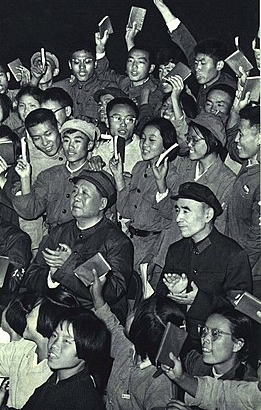Enemies of Freedom: Mao Zedong and the 1966 Cultural Revolution in China
In 1966, Mao Zedong launched what was known as “The Cultural Revolution.” This bloody period in China’s history lasted for more than a decade. Mao’s objective in calling for the revolution was to purge the People’s Republic of China of the bourgeois and capitalist elements that had allegedly infiltrated the government and produced a series of failures and setbacks in the communist nation’s development. In reality, it was an attempt by Mao, who was Chairman of the Communist Party of China, to reclaim social and political control in the country.
Mao created several radical groups to wage war against conservative and traditional groups within China. Groups of “Red Guards” went on the offensive to destroy precious artifacts in an effort to eliminate all memory of traditional Chinese culture. This also included attempts to eliminate all remaining traditional religious belief in the country, as it had been based, to a certain extent, on the idea that religious opinions were private and personal. To accomplish this, many historical and religious sites were destroyed by Mao’s revolutionaries.
Mao also called for the taking of all remaining private property from his “cultural” (i.e., political) enemies. In order to “cleanse the class ranks,” many people were sent to “the countryside” to work in “reeducation camps” (that is, concentration camps far removed from the eyes of people in the larger cities, at which hundreds of thousands – possibly millions – of people were tortured or killed). The Cultural Revolution finally ended with Mao’s death in 1976.
The terrible abuses of natural rights during Mao’s “Cultural Revolution” remind us of the importance of the United States Constitution, which explicitly guarantees the due process of law before anyone can be deprived of life, liberty, or property. The Constitution also enshrines the fundamental idea of individual freedom, perhaps most importantly in the First Amendment’s protection of religious liberty. And the separation of powers, and checks and balances written into the Constitution, make it less likely that any single so-called “Great Leader,” such as Mao, can carry out such brutal schemes of oppression and widespread murder. In the next essay, we will look at the wisdom of the Federalists and Anti-federalists affirming the importance of these ideas.
 Christopher C. Burkett is Associate Professor of History and Political Science, and Director of the Ashbrook Scholar Program at Ashland University.
Christopher C. Burkett is Associate Professor of History and Political Science, and Director of the Ashbrook Scholar Program at Ashland University.
Click here for American Exceptionalism Revealed 90-Day Study Schedule
Click here to receive our Daily 90-Day Study Essay emailed directly to your inbox

 https://en.wikipedia.org/wiki/Cultural_Revolution#/media/File:1966-11_1966%E5%B9%B4%E6%AF%9B%E6%B3%BD%E4%B8%9C%E6%9E%97%E5%BD%AA%E4%B8%8E%E7%BA%A2%E5%8D%AB%E5%85%B5.jpg
https://en.wikipedia.org/wiki/Cultural_Revolution#/media/File:1966-11_1966%E5%B9%B4%E6%AF%9B%E6%B3%BD%E4%B8%9C%E6%9E%97%E5%BD%AA%E4%B8%8E%E7%BA%A2%E5%8D%AB%E5%85%B5.jpg
 https://en.wikipedia.org/wiki/Cultural_Revolution#/media/File:1966-11_1966%E5%B9%B49%E6%9C%8815%E6%97%A5%E5%A4%A9%E5%AE%89%E9%97%A8%E6%B8%B8%E8%A1%8C-%E5%85%AB%E5%B1%8A%E5%8D%81%E4%B8%80%E4%B8%AD.jpg
https://en.wikipedia.org/wiki/Cultural_Revolution#/media/File:1966-11_1966%E5%B9%B49%E6%9C%8815%E6%97%A5%E5%A4%A9%E5%AE%89%E9%97%A8%E6%B8%B8%E8%A1%8C-%E5%85%AB%E5%B1%8A%E5%8D%81%E4%B8%80%E4%B8%AD.jpg
Great and informative essay. It’s feeling a lot like the USA.
We must not erase history. As Ronald Reagan famously wrote “Freedom is never more than one generation away from extinction.
We didn’t Pass it to our children in the bloodstream. It must be fought for, protected, and handed on for them to do the same.”